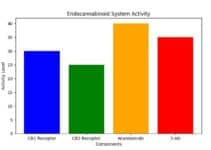People with epilepsy, who often experience inflammation and damage to the brain due to seizures, may benefit from Delta THC. These properties of Delta THC can help protect and heal the brain, ultimately improving the overall condition of individuals with epilepsy.
Additionally, Delta THC has been found to have a positive impact on mood and anxiety, which are common comorbidities in individuals with epilepsy.
By reducing anxiety and promoting a sense of calm, Delta THC can help individuals with epilepsy better manage their condition and improve their overall well-being. It is important to note that Delta THC, a compound found in cannabis, has shown promise in reducing the frequency of seizures in patients with epilepsy.
Click here to learn more about: ‘ bloomz hemp store review
How Delta THC works for epilepsy management
Delta THC, also known as delta-9-tetrahydrocannabinoid, interacts with the endocannabinoid system in the body to manage epilepsy, making it a valuable component of medical marijuana and cannabis. This crucial system regulates various bodily functions.
By binding to specific receptors in the brain, Delta THC can help reduce the frequency and severity of seizures.
Delta THC modulates the release of certain neurotransmitters.
This inhibition of excessive release of excitatory neurotransmitters can prevent seizures from being triggered. It is important to note that the effects of Delta THC may vary from person to person.
Therefore, its use should always be supervised by a healthcare professional. Although promising, further research is needed to fully understand the effectiveness and safety of Delta THC in epilepsy management
Effectiveness of Delta THC for epilepsy treatment
Delta THC, an antiepileptic compound, has emerged as a potential game-changer in epilepsy treatment. Numerous studies have demonstrated that this specific form of THC, which is found in cannabis, interacts with the body's endocannabinoid system to regulate seizures.
By targeting receptors in the brain, Delta THC has the ability to decrease both the frequency and severity of epileptic episodes.
It is important to take into consideration the potential side effects and individual differences in response to Delta THC.
It is highly recommended that patients consult with healthcare professionals to determine if Delta THC is an appropriate option for their epilepsy treatment. Further research is necessary to fully comprehend its effectiveness and safety profile
| Delta THC | Traditional Epilepsy Medications |
|---|---|
| Regulates seizures through the endocannabinoid system | Regulates seizures through other mechanisms |
| Decreases frequency and severity of epileptic episodes | May only decrease frequency or severity |
| Potential side effects and individual differences in response | May also have potential side effects and individual differences in response |
| Consultation with healthcare professionals recommended | Consultation with healthcare professionals recommended |
| Further research needed to fully comprehend effectiveness and safety profile | Further research needed to fully comprehend effectiveness and safety profile |
Comparing Delta THC and traditional epilepsy medication
When comparing Delta THC and traditional epilepsy medication, it is crucial to consider their potential impacts on epilepsy management and control. Traditional epilepsy medications have undergone extensive research and have been proven effective in regulating seizures.
On the other hand, Delta THC, a compound found in cannabis, has shown promise as a therapeutic option.
There is still limited scientific evidence supporting its efficacy, and further research is needed to determine appropriate dosages and fully understand its potential.
It is important to note that both options come with potential side effects, and the cost may also vary depending on the legal status of cannabis in your region. Therefore, it is highly recommended to consult with healthcare professionals to make an informed decision regarding epilepsy treatment
Relief provided by Delta THC for epilepsy
Delta THC, a compound derived from cannabis, is providing hope for individuals with epilepsy by offering epilepsy relief from seizures. This natural remedy has gained attention due to its potential to reduce both the frequency and severity of seizures.
One of the primary advantages of Delta THC in epilepsy treatment is its interaction with the body's endocannabinoid system.
This system plays a crucial role in regulating various functions such as mood, appetite, and sleep.
By modulating this system, Delta THC may help restore balance and decrease the occurrence of seizures.
Research has indicated that Delta THC possesses anticonvulsant properties, making it an effective option for preventing or lessening the intensity of seizures.
It has been found to have neuroprotective effects, providing protection to brain cells from damage caused by seizures. While further research is necessary to explore potential epilepsy treatments, such as epilepsy therapy, it is crucial to emphasize the importance of epilepsy support for patients in their journey towards finding relief.
| Advantages of Delta THC in Epilepsy Treatment |
|---|
| Interaction with the body's endocannabinoid system |
| Potential to reduce frequency and severity of seizures |
| Anticonvulsant properties |
| Neuroprotective effects |
Exploration of Delta THC as an antiepileptic agent
Delta THC, derived from cannabis, has shown potential as an epilepsy remedy, significantly reducing seizures in individuals with epilepsy. The exploration of Delta THC as an antiepileptic agent raises questions about its mechanisms of action and possible side effects.
Researchers are studying how Delta THC interacts with the endocannabinoid system in the brain, as well as its cognitive and mood effects.
It is important to understand the optimal dosage and administration method for Delta THC to ensure its safety and effectiveness as an *epilepsy remedy*.
More research is needed to fully understand the benefits and limitations of Delta THC as an antiepileptic agent, considering legal and regulatory factors
Promising therapy Delta THC for epilepsy
Delta THC, a promising therapy for epilepsy, offers a potential solution for individuals seeking an effective remedy for seizures. This cannabinoid compound, derived from cannabis, has demonstrated its ability to reduce seizure frequency and severity.
It is a valuable option for those in search of an epilepsy cure.
Unlike traditional cannabis-based treatments, Delta THC minimizes psychoactive effects, addressing concerns regarding mind-altering properties.
This therapy shows promise in alleviating other symptoms associated with epilepsy, such as anxiety and sleep disturbances. It provides individuals with a comprehensive option to manage their condition.
Additional research is required to fully understand the efficacy and safety profile of Delta THC as an epilepsy option
Delta THC as a Therapy for Epilepsy
- Delta THC has shown effectiveness in reducing seizure frequency and severity
- It offers a valuable option for individuals seeking an epilepsy cure
- Unlike traditional cannabis-based treatments, Delta THC minimizes psychoactive effects
- Delta THC shows promise in alleviating other symptoms associated with epilepsy, such as anxiety and sleep disturbances
Understanding Delta THC and cannabis in epilepsy control
While Delta THC has shown promise in controlling epilepsy, it is crucial to understand its potential benefits and risks in providing alternative methods for epilepsy alleviation. This alternative therapy, derived from cannabis, has been found to reduce the frequency and severity of seizures in some individuals with epilepsy.
It is important to note that Delta THC may also have adverse effects, including drowsiness, cognitive impairment, and dependency.
The legality and accessibility of cannabis vary, making it challenging for some individuals to consider it as a treatment option.
Continued research is needed to fully comprehend the efficacy and safety profile of Delta THC in managing epilepsy
Benefits and considerations of Delta THC in epilepsy treatment
Lead to side effects such as dizziness, drowsiness, and cognitive impairment can occur with epilepsy intervention. It is also important to consider the legal and regulatory aspects of using Delta THC as an epilepsy treatment, as its legality varies by jurisdiction.
Some countries and states have legalized the medical use of cannabis, including Delta THC, while others have stricter regulations.
It is important for individuals considering Delta THC as a treatment option to research and understand the legal implications in their specific location.
Overall, Delta THC shows promise as an effective intervention for epilepsy, but further research and clinical trials are needed to fully understand its safety and efficacy
Discover the Potent Effects of Delta 9 THC for Glaucoma Relief
Delta 9 THC Empowering Cancer Patients with Promising Results





